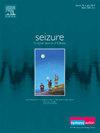Problems and needs in everyday life of people with late-onset epilepsy: A scoping review categorization using the international classification of functioning, disability and health (ICF)
IF 2.7
3区 医学
Q2 CLINICAL NEUROLOGY
引用次数: 0
Abstract
Background
Despite an increase in incidence and prevalence of late-onset epilepsy, research on the everyday lives of the people affected is lacking. Understanding the problems and needs of this heterogeneous group of people and their already established coping strategies is essential and guides further research.
Methods
A scoping review following PRISMA-ScR and JBI methodology was conducted to assess the current state of research on the problems and needs of individuals with late-onset epilepsy. Studies were categorized using the World Health Organization (WHO) ICF framework. A literature search (July 2024) was carried out in Medline, CINAHL, PubPsych, and PsycInfo and included individuals aged 65+ with epilepsy, focusing on everyday life and domesticity.
Results
Of 1360 identified records, 14 studies were analyzed. Findings show late-onset epilepsy impairs mental and physical function. The condition can be life-changing, affecting mobility, independence, and social relationships, often leading to isolation and dependence. Managing late-onset epilepsy extends beyond seizure control, necessitating coping strategies, support, effective communication, and addressing comorbidities and seizure unpredictability. The environmental factors influencing late-onset epilepsy include diagnostic tools, treatment options, informal and professional support, attitudes, and care with improved communication and education.
Conclusion
Our scoping review suggests that a multidisciplinary, patient-centered approach is essential to address the substantial mental, physical, and social challenges posed by late-onset epilepsy. This includes enhanced education for patients and healthcare providers, improved communication, and targeted interventions to manage comorbidities, reduce stigma, and improve overall quality of life (QoL).
迟发性癫痫患者日常生活中的问题和需求:使用国际功能、残疾和健康分类(ICF)进行范围审查分类
背景尽管晚发性癫痫的发病率和流行率有所上升,但对患者日常生活的研究却十分缺乏。我们按照 PRISMA-ScR 和 JBI 方法进行了范围综述,以评估有关晚发性癫痫患者的问题和需求的研究现状。研究采用世界卫生组织(WHO)的 ICF 框架进行分类。在 Medline、CINAHL、PubPsych 和 PsycInfo 上进行了文献检索(2024 年 7 月),包括 65 岁以上的癫痫患者,重点关注日常生活和家务。研究结果表明,晚发性癫痫会损害精神和身体功能。这种疾病会改变患者的生活,影响患者的行动能力、独立性和社会关系,往往会导致患者孤立无援和依赖他人。晚发性癫痫的治疗不仅仅局限于控制发作,还需要应对策略、支持、有效沟通以及解决合并症和发作不可预测性等问题。影响晚发性癫痫的环境因素包括诊断工具、治疗方案、非正式和专业的支持、态度以及改善沟通和教育的护理。这包括加强对患者和医疗服务提供者的教育、改善沟通,以及采取有针对性的干预措施来管理并发症、减少耻辱感和改善整体生活质量(QoL)。
本文章由计算机程序翻译,如有差异,请以英文原文为准。
求助全文
约1分钟内获得全文
求助全文
来源期刊

Seizure-European Journal of Epilepsy
医学-临床神经学
CiteScore
5.60
自引率
6.70%
发文量
231
审稿时长
34 days
期刊介绍:
Seizure - European Journal of Epilepsy is an international journal owned by Epilepsy Action (the largest member led epilepsy organisation in the UK). It provides a forum for papers on all topics related to epilepsy and seizure disorders.
 求助内容:
求助内容: 应助结果提醒方式:
应助结果提醒方式:


